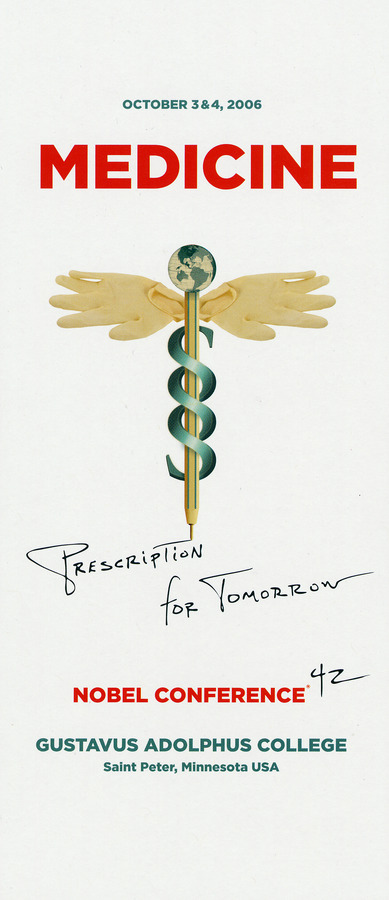Medicine: Prescription for Tomorrow, the 42nd Nobel Conference at Gustavus Adolphus College, October 3 and 4, 2006, will explore the successes of modern medicine and consider how it may further enrich our lives in the future. At the same time, the conference will also examine a number of public policy and medical care delivery challenges resulting from these advances.
For 41 years, Gustavus has organized and hosted the Nobel Conference, which draws about to 6,000 people to the college campus in St. Peter, Minn., and links a general audience, including high school students and teachers, with the world’s foremost scholars and researchers in debate centered on contemporary issues relating to the natural and social sciences.
2006 Nobel Conference Presenters:
- J. Michael Bishop shared the Nobel Prize in physiology/medicine in 1989 with colleague Harold Varmus for their research on oncogenes, normal genes that control growth in every living cell but can turn renegade and cancerous under certain conditions. Bishop’s research has led to significant breakthroughs in the understanding, diagnosis, and treatment of various cancers. [more]
- Henry Aaron is a Senior Fellow in Economic Studies, Brookings Institution, Washington, D.C. He has extensive research experience in a number of topics affecting older generations, including Social Security, healthcare finance, Medicaid and Medicare, income distribution, and tax policy. [more]
- Daniel Callahan is co-founder of The Hastings Center, Garrison, N.Y., a research and educational organization that examines ethical issues of medicine, biology, and the environment. His project on medicine and the market examines the impact of market theory, thinking, and practice on healthcare systems, with special focus on equity and healthcare costs. He is also a Senior Fellow at Harvard Medical School, directing its ethics program. [more]
- Canadian physician James Orbinski has worked with Médecins Sans Frontières/Doctors Without Borders (MSF) — the world’s largest independent medical humanitarian organization, with more that 400 projects in 80 countries. While president of the MSF International Council from 1998 through 2000, he accepted the 1999 Nobel Peace Prize on behalf of the organization. [more]
- Michael Osterholm, an international leader on bioterrorism and public health preparedness, is a frequently invited guest lecturer on epidemiology of infectious diseases, calling attention to the need for community preparedness for a coming influenza pandemic and voicing the growing concern about the use of biological agents as catastrophic weapons targeting civilian populations. [more]
- Dame Julia Polak, one of the most cited scientists in the world, with more than 1,000 original papers, review articles, and books to her credit, has been at the forefront of research into ways to grow human lung and bone tissue as alternatives to transplantation. [more]
- Jennifer West is widely recognized for cutting-edge research in two of bioengineering’s most competitive fields — nanotechnology and tissue engineering. Her research focuses on the synthesis, development, and application of biofunctional materials, such as materials for small-diameter vascular grafts that could eliminate the need for doctors to use veins from a patient’s leg for heart bypass surgery. [more]
More information about the conference, including additional information on each of the speakers, is available online.

Leave a Reply
You must be logged in to post a comment.